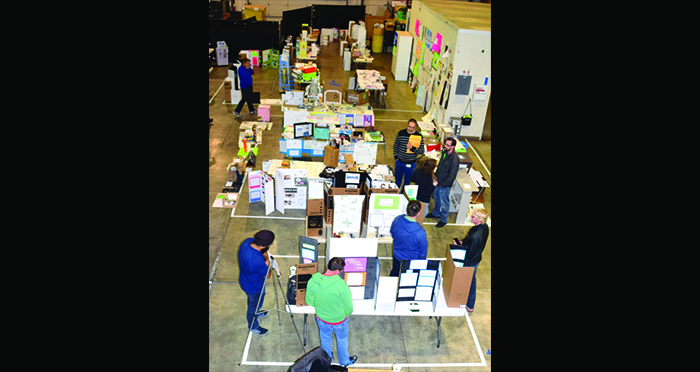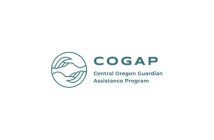(Photo above Inventerprise judges walking the floor | photo courtesy of Bend Research, a division of Capsugel)
New school machines and devices ruled the 25th annual Inventerprise contest, a science problem-solving contest sponsored by Bend Research, a division of Capsugel, with support from Bend-La Pine Schools and Central Oregon Community College.
Central Oregon students in grades K-12 were tasked with inventing something that would improve a familiar place: their schools. The young inventors rose to the challenge, creating solutions that focused on transportation, safety, learning, recreation and nutrition. Inventions included smart watches, handwriting gadgets, and robots that can serve lunch, pick up trash and even keep students engaged in learning.
More than 1,400 students from 38 Central Oregon schools participated in this year’s contest. Judges reviewed approximately 1,100 entries – the most the contest has ever received – and announced the winners today.
“As a leader in a technology-driven industry, Bend Research continues to place a high priority on supporting science education. That’s why we are always striving to find new ways to excite and encourage children and young adults to pursue scientific understanding in their everyday lives,” said Dory Koehler-King, Inventerprise Contest Director and Sr. Chemical Engineer at Bend Research. “The Inventerprise contest is one of several important outlets for this in our local community. The creativity with which the students approached this year’s problem statement was inspiring and gives us hope that this generation will be integral in solving the world’s most pressing problems.”
Students from Redmond Proficiency Academy swept the high school contest, winning $1,800 to split among the top three projects. David Novotny invented a working model of his pedal desk with a hand crank that lights up a beacon or sounds an alarm. The invention, which earned David $600, enables students to burn off some energy while powering their school. An innovative classroom modeled after fish hatcheries earned teammates Sam Gilbertson and Lyn Trail $300 each. Arely Aguilar and Lily Harrang analyzed the would-be energy savings from making their school meat-free and concluded this was the easiest way to conserve energy on a large scale. They also earned $300 each for their project.
In the middle school division, two students received grand prizes. Sophia Gonzalez and Hannah Tranby from Pilot Butte Middle School teamed up to create “Safer Quaker Bleachers,” an idea born out of their concern about the school’s proximity to the Cascadia subduction zone, which is likely to trigger a massive earthquake in our lifetime. The bleachers are designed to seat people for assemblies and sporting events and feature an added benefit in case of an earthquake: a safe space under the reinforced bleachers where they can wait out the shaking. For their prize, Sophia and Hannah each get to choose from an Apple Watch, a mountain bike, a GoPro® camera, a tablet computer or a season pass to Mount Bachelor.
Hundreds of students in lower grades submitted entries, either individually or as teams of up to three. Several students at each grade level will receive prizes for their submissions along with an invitation to a special Science Night program held in their honor at the Bend Research laboratories in Tumalo. Some inventions that made the biggest impressions include the following:
An inspired fourth grader designed a “Super Bus” with all the safety features you would imagine in the 21st century, including padded walls, roll bars, shatter-proof windows and ceiling curtain airbags.
A team of first graders devised a bookshelf that would hold more books and keep them better organized than current models. Students can select a book with the push of a button and avoid the potential danger of falling books.
Some kindergarteners want to zip line to their school, which does not offer bus service. They imagined setting up stations in the four quadrants of Bend where students could access their rides by fingerprint and zip off to school high above the city.
A fifth grader was looking out for his classmates who are confined to wheelchairs. He proposed some clever modifications to playground equipment, such as replacing stairs with ramps and installing a swing and slide that children can use without exiting their wheelchairs.
Additional information can be found at http://inventerprise.bendresearch.com





